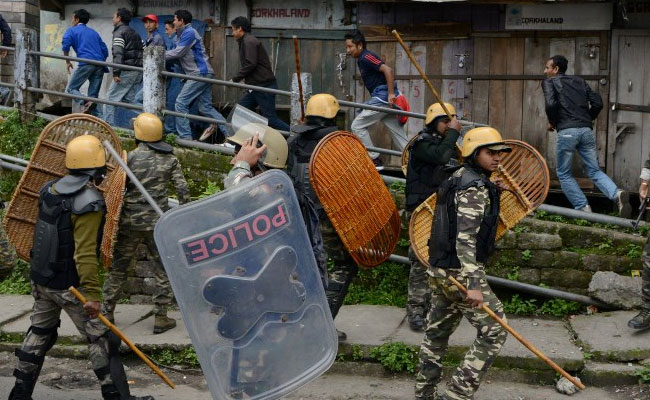The British and the Nepalese fought a bloody war in 1814-16 that resulted in a severe setback for the Nepalese. The treaty of Sugauli signed at the end of the war, transferred vast tracts of Nepal between the rivers Sutlej and Teesta to British India. Millions of Gorkhas thus became citizens of British India. Darjeeling, Kalimpong and even Sikkim became a part of India. Under British rule, the hills of Bengal were clubbed with Rajshahi division. Even when the British proceeded to partition Bengal along linguistic lines, separating Hindi speaking Bihar and Odia speaking Odisha, they did not grant Nepali-speaking Gorkhas in North Bengal a land of their own.
From 1907, the Gorkhas have been periodically demanding a state of their own. Facing repeated rejection of its demands at the hands of Nehru, the States Reorganization commission and even Indira Gandhi, the Gorkhaland movement gained momentum and violence broke out in the hills in the 1980s. Over 1200 people lost their lives.
As a part of the compromise, the Darjeeling Gorkha Hill Council (DGHC) was created under the leadership of Subhash Ghising, the man who had led the Gorkhaland movement. It seemed that the Gorkhaland movement had come to an end with the creation of an autonomous council. Sadly, it hadn’t.
The changing political scenario in Bengal where the Communists were being steadily sidelined by Trinamool Congress had a ripple effect in the hills as well. Subhas Ghising had been in power for nearly 2 decades and was seen as an establishment’s man. While peace had returned to the hills, the sentiment for Gorkhaland had not died down. The hills headed for another round of protests when Ghising’s former aide, Bimal Gurung broke away from Ghising’s Gorkhaland National Liberation Front (GNLF), launching his Gorkha Janmukti Morcha (GNF).
Ghising’s fall was quicker than his rise and he was forced to flee the hills. Bimal Gurung forced the government in Kolkata for another round of negotiations, resulting in the creation of Gorkhaland Territorial Council, which was to have more teeth than the widely discredited DGHC.
The creation of Telangana in 2013, spurred nascent state movements across the country. Gorkhaland was no different. Efforts were stepped up to demand statehood for Gorkhaland once again. GNF, which is a part of the NDA, was at the helm of protests demanding Gorkhaland. This was the situation for the last 3-4 years. A low intensity movement demanding Gorkhaland continued in the hills, with life going on as usual.
However, recently, Mamata government decided to make Bengali compulsory for students between classes 1st to 9th. The hills, inhabited mostly by Nepali speakers, were incensed at the temerity of the government to impose Bengali on the hills. Once again, the Gorkhaland issue which had been simmering for decades returned to the fore.
Protesters indulged in arson and violence, forcing Mamata to call for Army deployment in the hills for the first time in 40 years.
Bimal Gurung, who is the face of the Gorkhaland movement, slammed Mamata government for its step-motherly attitude towards the hills. For now, life in the hills has come to a standstill.
While the imposition of Bengali language might have precipitated the struggle, the fact is that politics on the ground might also be playing a part behind Bimal Gurung’s aggressive posturing. The GNF lost municipality elections in Mirik recently to TMC, which also opened accounts in Darjeeling, Kalimpong and Kurseong, something no plains-based party has been able to do for several decades. The loss of political power might have rankled the GNF and Bimal Gurung, with the language issue coming to them on a platter at the right time.
It will be interesting to see how Mamata Bannerjee and the Modi government handle this sensitive issue, which requires the state and the Union government to work closely together. Mamata’s animosity towards Modi government is well-known. It is also a fact that GNF is an ally of NDA government at the centre, thereby complicating what is already a very complex muddle. Acquiescing to the demands of Gorkhaland (however well deserved) at this time would encourage similar demands across the country, while a heavy-handed dealing would only serve to inflame passions. It seems unlikely that peace would return to the hills any time soon.
